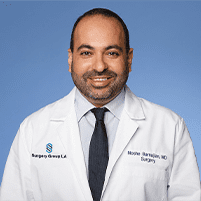Anal Fissure Specialist

Moshe Barnajian, MD
Minimally Invasive and Robotic Colorectal Surgeon based at Cedars Sinai, Los Angeles
Anal fissures are very small rips or tears that form in the lining of your anus — they’re often confused for hemorrhoids. If you’re experiencing fissure-related issues, including pain during bowel movements and anal bleeding, contact the office of Moshe Barnajian, MD, in the Beverly Grove neighborhood of Los Angeles, California, for an evaluation. You can book your anal fissure exam online, or you can call the West Hollywood-area colorectal practice directly.
Anal Fissure Q & A
What causes an anal fissure?
When the delicate, moist lining of your anus tears, you develop an anal fissure. This common and uncomfortable condition is usually associated with chronic constipation and passing of hard stools. Your anal fissure may also stem from:
- Anal intercourse
- Vaginal childbirth
- Chronic diarrhea
Your risk of suffering from an anal fissure also increases if you have Crohn’s disease, due to the constant inflammation of your intestinal tract.
Does an anal fissure cause symptoms?
Yes, in fact, anal fissures cause many of the same symptoms as hemorrhoids, so many patients come to the practice of Moshe Barnajian, MD, thinking they have hemorrhoids. If you have an anal fissure, you’re likely going to experience:
- Visible crack around your anus
- Pain during bowel movements
- Lump or skin tag near your anal fissure
- Bright red blood in your stool (or on toilet paper)
Anal fissures commonly affect young infants, but they can certainly occur in adults, too. No matter how minor or how severe your fissure symptoms may be, rest assured, Dr. Barnajian can help.
How does a doctor treat an anal fissure?
To confirm that you have an anal fissure, Dr. Barnajian performs a physical exam. He can usually see the fissure and diagnose you on the spot. Depending on the severity of your fissure, Dr. Barnajian may recommend:
- Dietary changes and increasing your fiber intake
- External nitroglycerine ointment
- Topical lidocaine numbing creams
- Botulinum injections (Botox®)
For chronic anal fissures or stubborn anal fissures that are resistant to conservative treatments, Dr. Barnajian could recommend surgery. Anal fissure surgery is called a lateral internal sphincterotomy (LIS). It involves making a small incision to remove some of your anal sphincter muscle to promote proper healing.
After an LIS procedure, proper care is important to lower your risk of recurrence. Fissures can come back if you have a hard bowel movement or experience any kind of trauma to the area. Dr. Barnajian counsels you about dietary considerations and lifestyle changes you can make to ensure your anal fissure surgery is a success.
Before you continue struggling with anal fissure issues, contact the office of Moshe Barnajian, MD, for an evaluation. Click on the online scheduling tool, or call the office directly.
